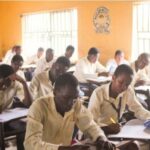See Reason Lagos Approves Yoruba Language Seeking Admission into JSS1
**Lagos Approves Yoruba Language for Testing Pupils Seeking Admission into JSS1**
In a significant move aimed at fostering cultural inclusivity and promoting local languages, the Lagos State Government has approved the use of Yoruba as a language option for testing pupils seeking admission into Junior Secondary School 1 (JSS1). This decision marks a pivotal shift in the educational landscape of Nigeria’s commercial capital, reflecting a broader commitment to integrating regional languages into the academic framework.
**Background and Rationale**
Historically, the primary medium of instruction and examination in Nigerian schools has been English, with local languages often relegated to extracurricular or elective status. However, recognizing the rich cultural heritage and linguistic diversity of Nigeria, the Lagos State Government has decided to incorporate Yoruba—a major indigenous language spoken by millions in southwestern Nigeria—into the admission process for JSS1.
The introduction of Yoruba language tests aims to achieve several objectives:
1. **Cultural Preservation**: By integrating Yoruba into the formal educational system, the government seeks to ensure that the language remains vibrant and relevant to new generations. This move helps in preserving the cultural identity of the Yoruba people, who have historically faced challenges in maintaining their linguistic heritage amid a predominantly English-speaking education system.
2. **Educational Equity**: Offering Yoruba as a testing option provides pupils who are more proficient in the language with a fairer opportunity to showcase their skills. This can be particularly advantageous for students from Yoruba-speaking backgrounds who may find it easier to excel in their mother tongue compared to English.
3. **Increased Inclusivity**: This initiative underscores the state’s commitment to inclusivity, ensuring that students from diverse linguistic backgrounds feel represented and valued in the educational system. It promotes a sense of belonging and encourages students to take pride in their cultural roots.
**Implementation and Impact**
The Lagos State Ministry of Education has outlined the implementation process for this new policy. Starting from the next academic session, pupils seeking admission into JSS1 will have the option to take the Yoruba language test alongside other subjects. This will involve the development of standardized test materials and the training of examiners to ensure the fairness and accuracy of the assessments.
Educational experts and stakeholders have lauded the move, noting that it aligns with global trends towards multilingual education and cultural inclusivity. They argue that this policy will not only benefit Yoruba-speaking students but also set a precedent for the inclusion of other indigenous languages in the educational system.
**Challenges and Future Directions**
While the decision has been broadly welcomed, some challenges are anticipated. Ensuring the availability of qualified Yoruba language teachers, developing appropriate test materials, and integrating this new system smoothly with existing educational frameworks will require careful planning and resources.
Looking forward, the Lagos State Government may explore similar initiatives for other indigenous languages in Nigeria, promoting a more inclusive and representative education system across the country. This approach could pave the way for a richer educational experience that respects and celebrates Nigeria’s linguistic diversity.
**Conclusion**
The approval of Yoruba as a language option for JSS1 admission tests in Lagos represents a progressive step towards a more culturally inclusive education system. It highlights the importance of preserving linguistic heritage while adapting to modern educa tional needs. As this policy unfolds, it will be closely watched as a potential model for other regions, signaling a broader commitment to embracing Nigeria’s diverse cultural landscape in the educational sphere.
tional needs. As this policy unfolds, it will be closely watched as a potential model for other regions, signaling a broader commitment to embracing Nigeria’s diverse cultural landscape in the educational sphere.
TRENDING SONGS
 Nigerian Woman Returns ₦330 Million Accidentally Credited to Her Account
Nigerian Woman Returns ₦330 Million Accidentally Credited to Her Account
 APC Don Reach Morocco?’ VeryDarkMan Reacts to Seyi Tinubu Poster
APC Don Reach Morocco?’ VeryDarkMan Reacts to Seyi Tinubu Poster
 Bride Breaks Down in Tears as Wedding Meals Were Kept Secretly While Guests Go Home Hungry
Bride Breaks Down in Tears as Wedding Meals Were Kept Secretly While Guests Go Home Hungry
 Odogwu by Day, Robber by Night: How Marriage Joy Turned Into Tragedy
Odogwu by Day, Robber by Night: How Marriage Joy Turned Into Tragedy
 Nigerian Officials Allegedly Pocket N4–6B Weekly Through Smuggling Cartels at Seme–Badagry Border
Nigerian Officials Allegedly Pocket N4–6B Weekly Through Smuggling Cartels at Seme–Badagry Border
 Ahmad Yerima: Naval Officer to Face No Sanctions After Clash with Wike – Matawalle
Ahmad Yerima: Naval Officer to Face No Sanctions After Clash with Wike – Matawalle
 Trending Video: Muslim Man Joins Wife in Hallelujah Challenge ‘Dress Like Your Miracle’ Night
Trending Video: Muslim Man Joins Wife in Hallelujah Challenge ‘Dress Like Your Miracle’ Night
 Woman Seeks Advice as Late Brother’s Wife Refuses to Mourn Him Following His Death With Alleged Mistress
Woman Seeks Advice as Late Brother’s Wife Refuses to Mourn Him Following His Death With Alleged Mistress
 Nobody Cares About Fine Girls In The UK, I Miss Nigeria — Nigerian Lady Laments
Nobody Cares About Fine Girls In The UK, I Miss Nigeria — Nigerian Lady Laments
 Wedding Called Off: How Lady Cancels Wedding After Finding Out Finance’s Affairs With Her Bestie
Wedding Called Off: How Lady Cancels Wedding After Finding Out Finance’s Affairs With Her Bestie
Share this post with your friends on ![]()













